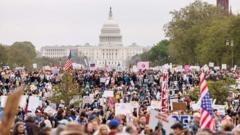Thousands of people across the United States took to the streets on Saturday, uniting in protests against President Trump's policies and leadership, marking the most extensive nationwide demonstrations since he took office in January. The rallies were organized under the "Hands Off" initiative, which aimed for gatherings in 1,200 locations spanning all 50 states. The expansive protests witnessed significant turnouts in major cities such as Boston, Washington D.C., New York, Chicago, and Los Angeles, with sentiments ranging from economic discontent to outrage over immigration policies.
The protests served as a response to freshly announced tariffs on imports along with widespread grievances surrounding social issues, notably immigration-related arrests of students. In Boston, law student Katie Smith highlighted the case of Turkish international student Rumeysa Ozturk, whose arrest near Tufts University was captured on film, emphasizing a sense of urgency and accountability: "You can stand up today or you can be taken later," she expressed.
Beyond the U.S., similar protests erupted in international cities like London, Paris, and Berlin, with demonstrators holding signs questioning America's political direction. Protesters in London were seen waving banners with phrases such as, “WTAF America?” as they chanted sentiments against Trump's altered foreign policy that included comments about annexing territories in Canada and Greenland.
In Washington D.C., thousands gathered to hear Democratic lawmakers deliver speeches that critiqued Trump's administration, particularly focusing on the influence of wealthy donors such as Elon Musk. Congressman Maxwell Frost vocally criticized what he described as the "billionaire takeover of our government," inciting the crowd with a rallying call to rise against governmental oppression: “When you steal from the people, expect the people to rise up. At the ballot box and in the streets.”
Recent election results in Florida and Wisconsin appeared to reflect a growing voter disenchantment with Trump, as Democrats capitalized on the administration's controversies. Polls indicated a slip in Trump's approval ratings, contributing to a charged atmosphere ripe for public dissent.
Many protesters voiced fear for their democratic rights, highlighting concerns over government funding cuts and the proposed impact on essential benefits such as retirement and education. A protester named Theresa conveyed her worries, stating, "We're losing our democratic rights," urging recognition of the critical issues affecting constituents.
While Trump spent the day golfing at one of his resorts in Florida, the White House defended his policies stating his commitment to protecting social welfare programs. Trump's immigration advisor dismissed the protests, downplaying their effectiveness. “Protests and rallies, they don't mean anything,” Tom Homan stated, suggesting the demonstrators were misdirected in their efforts.
As protesters in St. Paul, Minnesota displayed an upside-down American flag—a symbol of distress—across cities, they called for an urgent reevaluation of the current administration's direction amid a wave of growing discontent.





















